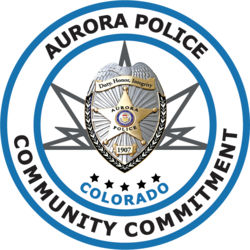Aurora Colorado Police Department
Overview
- Aurora, Colorado is located in north-central portion of the state and is an eastern suburb of Denver.
- Population: 386,261 [1]. Aurora is the third most populous city in the State of Colorado[2] and the 51st most populous city in the United States.[3]
- Officers: 744[4]
Body Camera Policy
The published policy[5] states that cameras are:
- activated manually by the operator
- capable of a 30-second pre-event video buffer. No audio is recorded during the 30-second buffer period.
- shall be turned to the on position at the beginning of the shift. To record both audio and video, a second activation of the camera is required.
- to be activated as soon as practical during a list of interactions.
Officers should, when possible, inform individuals that they are being recorded.
Video is retained for a minimum of 60 days.
Incidents
Officers
- Michael Dieck
- Kyle Dittrich
- Martin Garland
- Jaron Jones
- Erica Marrero
- Randy Roedema
- Jason Rosenblatt
- Julie Stahnke
- Nathan Woodyard
Policy Changes
2021 - Use of Critical Incident Response Teams
On April 23, 2021, the Aurora Police Department announced that it would be using two local "Critical Incident Response Teams" (CIRT) to investigate shootings and in-custody deaths involving Aurora officers.[6]
2020 - Mandatory Body Camera Availability and Recording
Effective 7/1/2023, recording entire incidents is required by state law.[7]
June 9, 2020 - Multiple Directive Changes
Several changes were announced on June 9, 2020.
Carotid Control Hold (Prohibited)
Members are not authorized to use the carotid control hold, or any choke hold that restricts the airway. [8]
Issue Warning Before Firing
"An officer must identify himself/herself as an officer and give a clear verbal warning of the intent to shoot."[9] This section isn't highlighted as new in the directives, but CBS4 included it in their list of new reforms.[10]
Officer Relief
Defines the "replacement of officers who have been involved in a physical struggle/fight/violent event with a subject by other arriving officers who should be less emotionally involved and may help keep the situation from escalating to unnecessary physical levels" [11]
Duty to Intervene
SB20-217: "This directive outlines the obligation that sworn members have in intervening in use of force incidents where they witness a level of force, they believe clearly exceeds that allowed by law."[12]
Responding to Suspicious Calls
Police officers will now have the discretion to not contact an individual after dispatch receives a report of a suspicious person if an officer observes that person and doesn't have reason to believe that he or she "was, is, or, seems to be about to engage in criminal activity." [13][14]
References
- ↑ "QuickFacts - Aurora city, Colorado", United States Census, 2020-04-01
- ↑ wikipedia:List of municipalities in Colorado
- ↑ Wikipedia::List of United States cities by population
- ↑ "Aurora Police Department", Aurora Government Website, 2020-09-06
- ↑ Aurora Police Department Body Worn Camera Directives, Aurora Police Department, 2021-03-04
- ↑ Janet Oravetz, Independent teams will now investigate incidents involving Aurora Police officers, 9News, 2021-04-23
- ↑ Colorado SB20-217 - Enhance Law Enforcement Integrity, Colorado State Legislature, 2020-06-19
- ↑ Aurora Police Department Less Lethal Directives
- ↑ Aurora Police Department Authorized Firing Directives
- ↑ Aurora Police Officers Face Policy Changes Amid Calls For Independent Investigation, CBS4, 2020-06-09
- ↑ Aurora Police Department Officer Relief Process
- ↑ Aurora Police Department Duty to Intervene
- ↑ Conor McCorick-Cavanagh, Aurora Changing Policing Policies in Wake of George Floyd Protests, Westword, 2020-06-10
- ↑ Aurora Police Department Suspicious Calls
Recent articles: Joshua Nahulu, Curtis Cochran, Johnathan Edwards, David Boruchowitz, U.S. Customs and Border Protection Drug Trafficking (2021-2024)
To check for incidents in your area, please use the search page. Or try a random incident!
